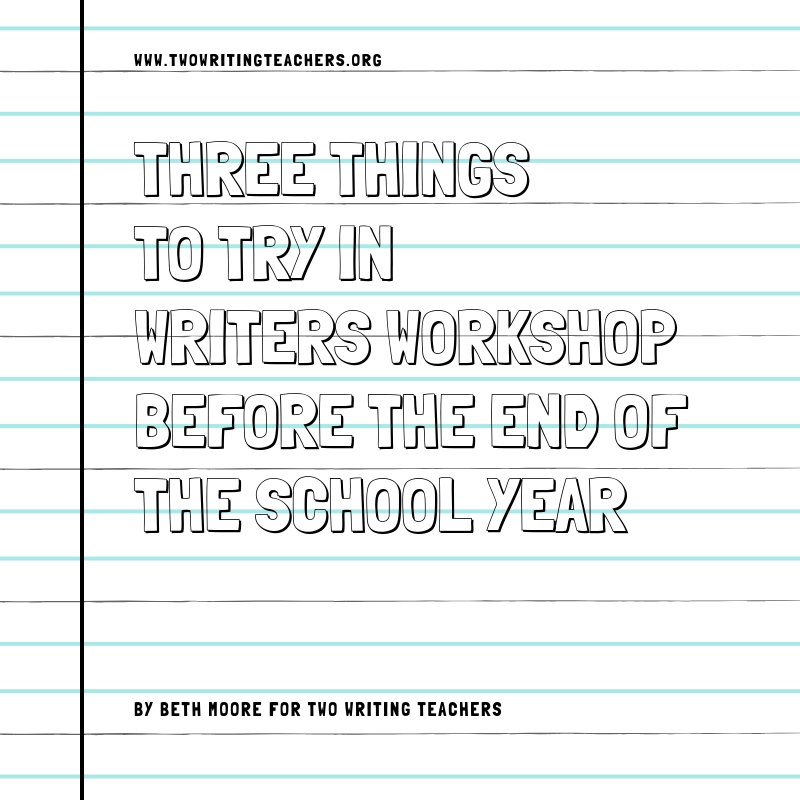
1. TRUE FREEWRITING
When I was a new teacher, workshop teaching was wild and mostly unstructured, published units of study didn’t exist, and kids wrote pretty much anything they wanted. Kids moved through a writing process at their own pace (generate ideas, develop one idea, plan, draft, revise, edit, publish), and we conferred with each writer individually. One student might be writing poetry, the next might be making a video-game “cheats” book, the next might be a true story involving a pet guinea pig.
Writing workshop has come a long way. We teach units of study, allowing our students to be immersed in a genre they’ll be working on over time, with opportunities for repeated practice and explicit instruction and feedback in how to write well in that genre.
However, the pendulum has swung so far over to the structured end of workshop teaching, that some kids go through school year after year never experiencing true freewriting.
Freewriting–simply writing what you want, selecting your own audience, purpose, and genre–is something you simply must give you and your students a chance to try before the year is over.
2. AN ENTIRE WORKSHOP OF COMPLIMENTS
This is something every teacher should put on their bucket list for the school year. Just for one day, do nothing but compliment your students on what they are already doing really well as writers.
Teach a minilesson that highlights a strategy that a group of students is already doing, using their work as the mentor text.
Confer by moving quickly from student to student, noticing and naming specific strategies students are using effectively and encouraging them to continue.
Hold a small group by using a piece of student writing that exemplifies a really helpful strategy that other students could try immediately.
Interrupt the class from time to time to highlight great work that is happening in the room.
Wrap up the workshop by sharing, in rapid succession, a stack of student work where students have each done something other kids might want to try.
At the end the workshop, think to yourself, how could every day be a little bit more based on compliments?
3. ALLOW KIDS TO COAUTHOR SOMETHING
Writing partners play an important role in most writing workshops, but typically we ask students to do all their own writing. This is to protect each student’s right to their own work, ensuring they have enough time to write, enough independent practice, and to make sure students don’t become reliant on someone else to do the work for them.
However, some students LOVE to coauthor books together. For example, sitting side by side, one student might write a little while the other looks on, coaches their partner, and thinks of what to write next–then the second student writes a little. They could go back and forth like this, on and on, forever. Other partners take on different roles – one student happily scribes everything while the other student says all the ideas aloud. Another partnership might involve a clear author/illustrator type of relationship.
A few years ago, in a third grade classroom, two boys whom I knew to avoid writing at all costs, shared with me a script for a “Harry Potter Show” they had been working on for weeks at recess. In another classroom, a group of girls coauthored an elaborate adaptation to Cinderella that took place under the sea, each writer taking on a chapter of their carefully planned out book, frequently coming together to see if the parts were still fitting and making frequent revisions to the plan.
The end of the year is a great time to try new things. You’ve made it through all your essential teaching, kids are nearly ready to move on to the next grade level, your routines and management are as good as they are ever going to get. It’s now or never to try a few “riskier” new things before the year is over.
Discover more from TWO WRITING TEACHERS
Subscribe to get the latest posts sent to your email.


So true that the pendulum swings a bit too far in education and we lose sight of the the original intent of the change. I love this post! I find myself suggesting that teachers read Lucy Calkins’ Lessons from a Child, or Donald Graves’ Writers, Teachers and Children at Work, because of this sense that we have lost some of the intent and joy that made writing workshop so wonderful. But, that is not a practical suggestion. The suggestions in this post, however, are practical and easy to implement, and yet capture the joy and intent that are missing these days. This is a post I will treasure and share. Thank you!!!
LikeLike
One and three are things we do all the time (every Friday and at quiet time). Number two is a great idea!
LikeLike